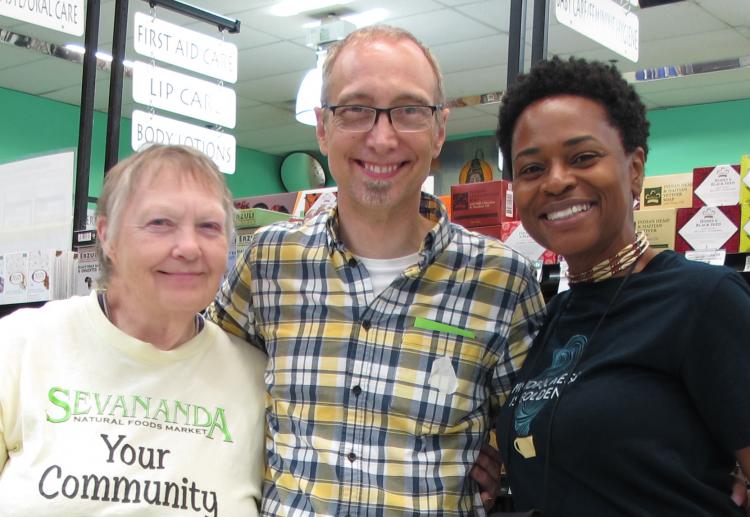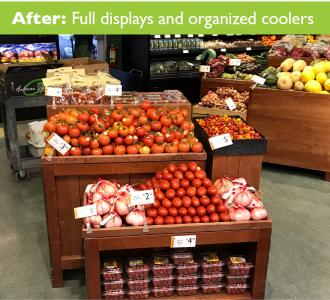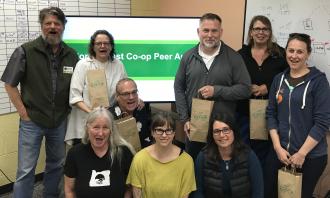National Co+op Grocers Supports Co-op Success



Those familiar with the cooerative movement in the U.S. know that purchasing co-ops are a growing and critical factor in the success of small and independent businesses in all sectors of the economy. By bringing the purchasing power of many small companies together, these co-ops make it possible for thousands of retailers and service providers to compete against large chains. And operating as cooperatives gives these independents direct control in negotiating favorable terms and conditions vital to their ongoing success.
In many ways, National Co+op Grocers (NCG) is just like those purchasing co-ops. In bringing together a combined business volume of more than $2 billion, NCG is able to negotiate better prices, contract terms, and specialized services for its member co-ops. But in two major ways, NCG is not a typical purchasing co-op:
• NCG’s members are cooperatives. They operate according to the same principles and values embraced by all cooperatives. As a purchasing co-op, NCG supports the success of its member cooperatives economically, but it also supports them in fulfilling their larger mission and purpose as cooperatives.
• NCG’s services extend far beyond enhancing purchasing power. The type of developmental and operational support that NCG provides to its members is unique among U.S. purchasing co-ops.
Supporting co-op success
NCG has a core team of staff devoted to providing targeted development support to its co-ops. Our Co-op Development Team is made up of 24 staff members; their job is to directly support financial and operational success at NCG co-ops. The team’s goal is to be a trusted and effective partner in support of the continual improvement of the customer experience and the pursuit of retail excellence.
The team supports co-op success in three main ways:
1. Monitoring and checking in on each co-op’s operations and needs. This work includes store visits, regular calls, retreats and training sessions, as well as formal and informal coaching support. The work is focused primarily at the corridor (regional) level. Along with others, corridor development directors and corridor advisors keep an eye out for opportunities to support each co-op’s growth and development.
Most recently, NCG co-ops received an “NCG Participation Report.” This was a summary of the direct and indirect benefits the co-op gained from its participation in NCG. The report also offered an overview of each co-op’s five-year trends in key financial metrics.
2. Providing referrals and helping co-ops tap outside resources. This work includes referrals to consultants (such as CDS Consulting Co-op) and industry resources (such as the Food Marketing Institute and Sustainable Food Trade Association). It also includes referrals to peers: co-ops that have experience or expertise in a specific area. Peer-to-peer connections are an important part of the NCG experience—both in our commitment to the principle of “cooperation among co-ops” and the belief that a commitment to one another’s success is inherent in food co-op culture and is a key element of co-op identity.
One specific resource that NCG helps coordinate is the peer audit. A peer audit is a deep and detailed review of a co-op’s operations in selected areas by a team of NCG staff and peer co-op managers chosen for their expertise and experience. Audits are conducted at no cost to the co-op. The process involves identifying priority target areas, collecting and reviewing background data and materials in those areas, coordinating the team’s onsite visit (scheduling, travel, lodging and onsite time, which generally includes interviews with key staff), and compiling a detailed report with recommended actions to complete within three, six, and twelve months. A key factor in a peer audit’s ability to really bring high-value improvements is follow-up by the audit team and onsite managers.
3. Direct retail support services by Co-op Development Team staff. NCG corridor staff includes those with deep expertise in key areas of retail operations. Co-ops can tap these staff for assessments (for example: Why is this department’s performance lagging in relation to peers? How can we improve our fresh food offerings?) as well as for specific projects such as a department reset or pricing strategy review, or for general troubleshooting. Staff provide these services for grocery, wellness, and fresh departments (produce, meat/seafood and prepared foods). These retail support services are often the quickest way for a co-op to bring about changes, especially if the co-op already has a clearly identified goal.
Finally, the Co-op Development Team has four employees positioned to provide administrative support and guidance. The business services managers are specialists in finance, marketing, business technology and human resources. They are available to provide assessments, review strategies, assist with big projects, and even advise on hiring. They also create tools, resources and document preferred practices for co-ops, and develop programs to help administrative managers reduce costs or improve systems and quality of work.
In all ways, NCG staff is committed to the short- and long-term success of our member and associate co-ops. Our success depends at an integral level on the success of each participating co-op. NCG offers services in a partnership with retail co-ops and looks for new ways to bring that spirit and approach into our work each and every day. •
************************************************************************************************************************************************************
NCG Retail Specialist Improves Produce Department
By Jeffrey Owens, NCG Western Corridor Produce Specialist
Community Food Co-op is a successful two-store co-op in Bozeman, Montana, with annual sales of $21 million. The co-op’s general manager, Kelly Wiseman, wanted an outside perspective on the Downtown store’s produce department operations to improve its merchandising and product quality, as well as the skills and performance of the entire department team. I was asked to work with him and other co-op staff on how to sustain visually impactful merchandising to support positive sales growth and margin stability.
Working with the co-op’s produce department staff, we reset the department. Staff members were experienced, so the merchandising support was mostly about helping them identify opportunities for growth through a fresh perspective. The co-op saw immediate results:
• Sales increased by 15 percent in the first week and continued to average about 16 percent over prior levels for the next two months.
• With better merchandising and product placement, margin also improved. Prior to our engagement, produce margin was 28.04 percent. It had improved to 32.86 percent by the next quarter.
Most importantly, I was able to help bring fresh eyes and a renewed perspective to the team. In Kelly’s words, “Jeffrey instantly impressed our team not only with his depth of knowledge but in the commonsense way he has of explaining things. Our team learned not only how sets should look but how to better identify what shoppers are looking for in the department. Our produce department now accommodates more people buying more food, which means an increase in sales and basket size.”
By working together, we help co-ops move the needle for improved retail execution and enhanced customer experiences. That’s what “stronger together” is really all about! •







